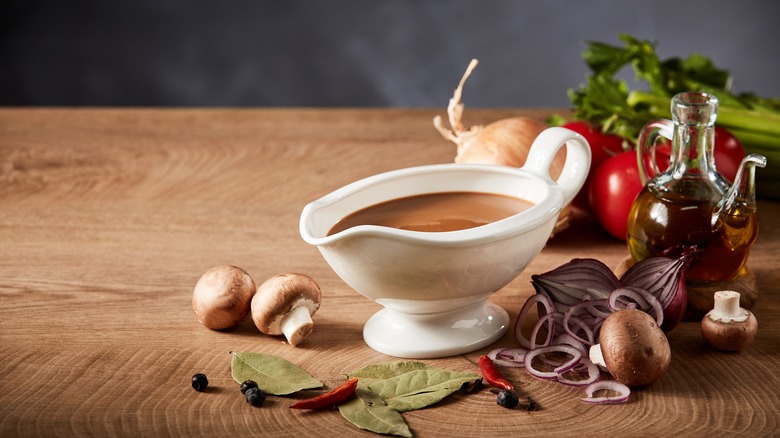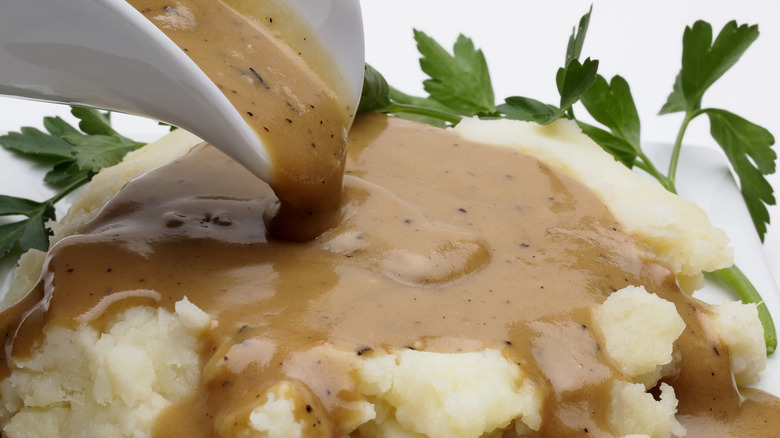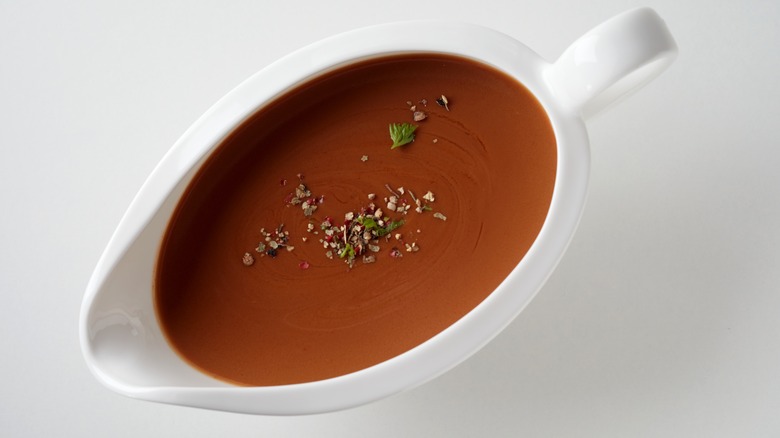The Nut Butter Hack That's Here To Save Your Burnt Gravy
From topping mashed potatoes to saving a dry Thanksgiving turkey, gravy can be a real hero. But if that glorious sauce gets burnt, never fear: nut butter can be the solution to salvage that bitter taste. Although avoiding burnt gravy is best, when it does happen, a cook might not have all the ingredients in order to start over. Instead, grab your nearest jar of nut butter. Then, remove most of the gravy from the original pan. The longer it sits with the burnt bits, the more likely it is to take on an unpleasant taste.
Next, whisk a small scoop of nut butter into the burnt portion to balance the bitter taste, which often comes from sugar cooking for too long. The nut butter has a bit of sugar, fat, and acid, which can put overly smoky notes back into balance. It will take trial and error to totally mask the offending flavor when the entire pan of gravy is brought back together, but with some patience, it can be done.
The downside to this cooking hack: if someone has a nut allergy, this trick is a hard no. Instead, you'll have to grab a jar of gravy from the pantry and reason that store bought is better than nothing.
The allergen-friendly way to save burnt gravy
While nut butter might whisk away that bitter burnt taste, it's not an allergen-friendly option. Luckily, some types of potatoes can help mitigate that offending flavor. Anyone who has served mashed potatoes can appreciate how the dish easily absorbs seasonings and other ingredients. The same concept applies to a burnt gravy.
Adding peeled, diced potatoes to the pan can help absorb the negative flavor. These potatoes are not meant to be eaten afterwards nor should they be mashed, smashed, or otherwise incorporated into the gravy. Instead, they act like a giant sponge that can absorb bitter flavor. It will take a while to let the potatoes work their magic, however, so prepare to be patient.
If you don't have potatoes on hand, cantaloupe might work in the same way as potato, though it can add a sweet note to the gravy. In the end, adding ingredients that can absorb the acidic flavor might save a burnt gravy. It's certainly better than trying to convince people that gravy should taste like campfire ashes.
Rescue burnt gravy with this salad dressing staple
Saving a burnt gravy requires balancing the astringent flavor with other ingredients. One option is balsamic vinegar or another type of vinegar, cider, or even wine. While it might seem counterintuitive to add more acid, it can help dull the smokiness of a burnt sauce. But only a little splash is needed. While the aroma will instantly change, no one wants that flavor punch to overwhelm everything else in a scenario that is just as bad as the burnt bits.
Another old standby is to add fat, like a splash of cream or a small amount of butter. Use fat sparingly and be sure to incorporate it well into the gravy. However, fat could cause the gravy to break, or lose its emulsified state. Adding another cooking error to the mix might just have you putting the gravy boat back in the cabinet for another time.


